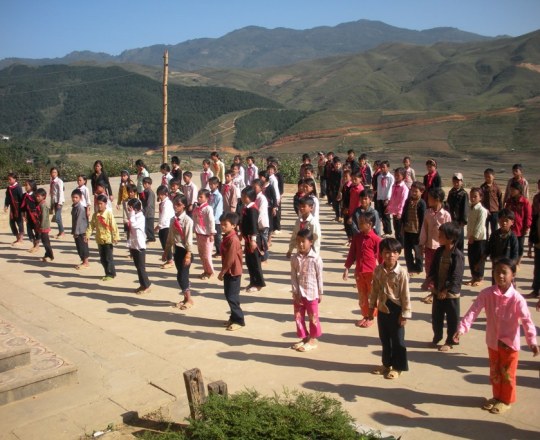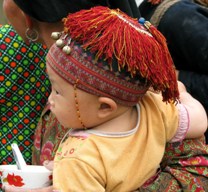Tu Le School : Vietnam
In 2009 we made contact with a remote school in Tu Le North Weat Vietnam. Most of students are from the Dao minoritity. The head master of the school asked if it was possible we could provide 230 plastic chairs for their students. The chairs are used for school and for outdoor meeting every Monday morning. Redspokes customers have also contributed materials for the school.
For more information on the Deo minority, see below!
......................................................................................................
Social organization: Village relationships are essentially regulated by parentage or by being neighbours. The Dao people have many family surnames, the most popular being Ban, Trieu. Each lineage or each branch possesses its own genealogical register and a system of different middle names to distinguish people of different generations.
Birth: Dao women give birth to their children in the seated position, and usually in the bedroom. The newborn is given a bath with hot water. The family of the expectant mother usually hangs green tree branches or banana flowers in front of their door to prevent evil spirit from doing harm to the baby. When the baby is three days old, they celebrate a ritual in honor of the mother.
Marriage: Boy and girl who want to get married must have their dates of birth compared and consult with a diviner who interprets their future in a ritual using chicken legs to see if they are a compatible match. During the course of the marriage ceremony, the Dao have the custom of stretching a piece of string in front of the procession, or exchanging songs between the coupleís families before entering the house. When the bride comes to the groomís house, she is carried on his back, and she must step over a pair of blessed scissors when crossing the threshold into the husbandís home.
Funerals: A men called thay tao plays an important role in the funeral. When there is a death in the family, the deceasedís children will have to invite him to supervise the rituals and fine a piece of land for the grave. Care is taken so that the corpse will not be laid out at the same time someone in the family has been born. The deceased, who may be wrapped in a mat, is placed in the coffin inside the home. Then it is carried to the grave. The grave is built of earth and lined with stones. In some Dao areas, the body is cremated if the deceased is older than 12 years old of age. Funeral rituals celebrated to ensure that the deceased rests in peace may take place mane years after the burial. The ceremony usually coincides with initiation rites (cap sac) for a Dao man of the family. The celebration takes place over the course of three days. The first day liberates the spirit of the deceased, and is likened to a break from jail. On the second day, the deceased is worshiped in the house. Then, on the last day, the manís initiation rite takes. At this point, a particular rite returns the deceasedís spirit to its homeland, Duong Chau.
Building a New House: the age of different members of the family must be considered before a new house is built. This is especially true in the case of the age of the head of the household. The Dao ritual for selecting the land for a new house is considered very important. It takes place at night and involves digging a hole as big as a bowl, arranging grains of rice to represent people, cows, buffaloes, money, rice, and property. And this is placed into the bowl. Based on the dreams that follow in the night, the family will know whether it is good to build the house. The next morning, the family inspects the hole to see if the rice remains and if it is possible to build the house.
Beliefs: Dao religious beliefs include traditional practices and agricultural rituals mixed with elements of Confucianism, Buddhism and Taoism. Ban vuong is considered the earliest ancestor of the Dao people, so he is worshiped together with the ancestors of the family. In Dao tradition, all grown-up men must pass an initiation rite, cap sac, which expresses the traits of Taoism and the ancient rituals.




